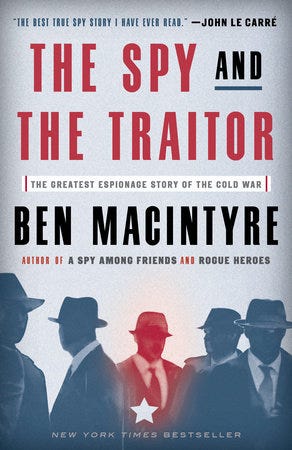Sunday Snapshots (23rd August, 2020)
The Spy and The Traitor Pt. 2, The musician in the machine, Uber/Lyft and government regulation, Nuclear submarines, NYC rubber stamps, and The Swamp
Hey everyone,
Greetings from Washington, D.C.!
It's been a long and humid week in the nation's capital. I’ve been exploring the monuments, trying out some new restaurants, and making new friends on socially distanced walks.

Two things from my end:
Are you tired of soulless newsletters that curate business news? Check out my friend Tom White's newsletter White Noise. Tom is better at writing narratively than anyone I know and his work is well worth your time.
I got some gorgeous stamps from the post office and would love to send you a postcard to thank you for being a reader. I really enjoyed this the last time I sent these out and I’m looking forward to writing them! Just fill out this form if you want one.
With all that out of the way, let's get into this week's Snapshots in which I want to explore:
The Spy and The Traitor Pt. 2
The Musician in the Machine
Uber/Lyft and government regulations
Submarines, Rubber Stamps, and The Swamp
Book of the week

Rarely does a book keep me awake until 3 am because of how exciting it is. That happened multiple times with The Spy and The Traitor this week. Last time, we talked about the idealogical reaction Soviet spy Oleg Gordievsky had to being exposed to the west and his cultivation as a double agent by British intelligence.
The second half of the book is the story of what the fruits of this cultivation led to, how Oleg’s cover was blown, and his eventual escape.
Oleg’s biggest achievements were creating the conditions in which diplomacy could be conducted. Soviet Russia was frighteningly opaque and this double agent gave British intelligence a peek behind the action. This understanding went to the very top. On one of Margaret Thatcher’s trip to Moscow, she met the promising Soviet politician and soon-to-be Premier Mikhail Gorbachev. Oleg passed information about what points the British would be amenable to to the Soviets and vice versa. The political art of compromise requires a common language. What Oleg provided both parties was not just a common language, but the same script. It would be hyperbole to say that Gordievsky was responsible for the fall of the Berlin Wall and the Soviet Union. But he definitely made some very big cracks in the iron curtain.
Ultimately, his cover was blown not by the British, but by a CIA agent named Aldrich Ames who had been passed information revealed by Gordievsky. Ames and his wife had expensive tastes and felt under appreciated by his peers at the CIA. A dangerous cocktail of greed and ego made him offer his services to the KGB. The KGB were happy to accept. Ames revealed the identity of dozens of Western agents in the KGB ranks, but none were nearly as important as Oleg Gordievsky – the head of the London station of the KGB. Oleg was summoned from London to Moscow and questioned by his superiors. While they were collecting more evidence of his betrayal, MI6 exfiltrated him from the country by putting him at the back of a diplomatic car across the Danish border. He now lives in a London safe house and has received multiple awards from foreign governments for his services.
It’s interesting to think about the relevance of spies in the world of cyber espionage. It may be true that a hacker can do more damage in his pajamas before their first cup of Earl Grey than a field agent can do in entire year. But digital capabilities can be commoditized in the same way that weapon’s capabilities can be commoditized to a large extent. What a human spy offers – with all their imperfections and almost because of their imperfections – is an arbitrage opportunity. Arbitrage that can be exploited and channelled into something greater. Oleg Gordievsky’s human mind accepted the freedom and liberty of the western world over the stifling Soviet regime. That imperfection contributed to the downfall of that regime.
The Spy and The Traitor was one of my favorite books of the year. It’s a real story that read like a James Bond novel. I highly recommend it.
Long read of the week

A team of researchers give an amazing explainer on how to create music using AI. Technical yet accessible, this is the kind of post that I aim to write. Check it out.
Business move of the week
Uber and Lyft halt services to push back against the California government
To start off, let's delineate what should be done from what was done. I think there are valid arguments on both sides of the argument of whether or not drivers that are on the supply side of the ride-hailing businesses should be traditional W-2 employees or not. I suspect that the truth will be somewhere in the middle, where a new category of gig workers are created by the tax code and traditional benefits associated with full-time employees will be offered to drivers. They’ll likely have to sacrifice some flexibility in order to get it. We’ll see how the dust settles.
What I wanted to share today was the response from the two giants in the game – Uber and Lyft. They simply said, “Hey, we can’t operate in California if we have to treat our drivers as full-time employees. Good luck explaining the nuances of that to your constituents.”
This is something that Uber specifically has been pretty effective at since its inception. They famously had a “de Blasio” option in their app when going up against the NYC mayor and the taxi lobby. This is well chronicled in The Fixer by Uber’s lawyer during the time, Bradley Tusk.
If these companies want to learn how to work with (or against) governments, it is worth re-visiting the questions that Tusk asks his clients:
What’s the jurisdiction?
Can you count on grassroots support from your customers?
Do you have enough customers to move the needle if mobilized?
How sympathetic is the media?
What tools do you have at your disposal?
The odds don’t look good for the government. Tusk’s The Fixer is an excellent read and can provide useful framework for this fight. I recommend you check it out.
Odds and ends of the week
Three videos this week:
How a nuclear submarine works: Destin of the SmarterEveryDay YouTube channel gets exclusive access to tour a nuclear submarine and is in the middle of a multi-part series. Amazing stuff.
NYC’s Rubber Stamp Shop: One of the nostalgia based video that are simply delightful.
The Swamp: A documentary about how structural corruption and lobbying affects US politics. It’s now streaming on HBO.
That wraps up this week’s newsletter. You can check out the previous issues here.
If you want to discuss any of the ideas mentioned above or have any books/papers/links you think would be interesting to share on a future edition of Sunday Snapshots, please reach out to me by replying to this email or sending me a direct message on Twitter at @sidharthajha.
Until next Sunday,
Sid